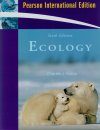Textbook
By: Charles J Krebs(Author)
646 pages, colour photos, colour illustrations, colour maps, colour tables
![Ecology Ecology]()
Click to have a closer look
About this book
Contents
Customer reviews
Biography
Related titles
About this book
Charles Krebs' best-selling majors-level text approaches ecology as a series of problems that are best understood by evaluating empirical evidence through data analysis and application of quantitative reasoning. No other text presents analytical, quantitative, and statistical ecological information in an equally accessible style for students. Reflecting the way ecologists actually practice, the new edition emphasizes the role of experiments in testing ecological ideas and discusses many contemporary and controversial problems related to distribution and abundance.
Ecology: The Experimental Analysis of Distribution and Abundance, Sixth Edition builds on a clear writing style, historical perspective, and emphasis on data analysis with an updated, reorganized discussion of key topics and two new chapters on climate change and animal behavior. Key concepts and key terms are now included at the beginning of each chapter to help students focus on what is most important within each chapter, mathematical analyses are broken down step by step in a new feature called "Working with the Data," concepts are reinforced throughout the text with examples from the literature, and end-of-chapter questions and problems emphasize application.
Contents
| WHAT IS ECOLOGY?
1. Introduction to the Science of Ecology
2. Evolution and Ecology
3. Behavioral Ecology
II. GEOGRAPHIC DISTRIBUTIONS
4. Analyzing Geographic Distributions
5. Factors That Limit Distributions I: Biotic
6. Factors That Limit Distributions II: Abiotic
7. Distribution and Abundance
III. THE PROBLEM OF ABUNDANCE: POPULATIONS
8. Population Parameters and Demographic Techniques
9. Population Growth
10. Species Interactions I: Competition
11. Species Interactions II: Predation
12. Species Interactions III: Herbivory and Mutualism
13. Species Interactions IV: Disease and Parasitism
14. Regulation of Population Size
15. Applied Problems I: Harvesting Populations
16. Applied Problems II: Pest Control
17. Applied Problems III: Conservation Biology
IV. DISTRIBUTION AND ABUNDANCE AT THE COMMUNITY LEVEL
18. Community Structure
19. Community Dynamics I: Biodiversity
20. Community Dynamics II: Predation and Competition
21. Community Dynamics III: Nonequilibrium Communities
22. Ecosystem Metabolism I: Primary Production
23. Ecosystem Metabolism II: Secondary Production
24. Ecosystem Metabolism III: Nutrient Cycles
25. Ecosystem Dynamics under Changing Climates
26. Ecosystem Health: Human Impacts
Appendix I - A Primer on Population Genetics
Appendix II - Instantaneous and Finite Rates
Appendix III - Species Diversity Measures of Heterogeneity
Glossary
Bibliography
Credits
Species Index
Subject Index
Customer Reviews
Biography
Charles Krebs is Emeritus Professor of Zoology at the University of British Columbia in Vancouver. He received his B.S. from the University of Minnesota and earned both his M.A. and Ph.D. from the University of British Columbia. In addition to teaching ecology for 40 years, he works extensively on the population of rodents in Northern Canada, the United States, and Australia, trying to understand the mechanisms behind population fluctuations. He has published three ecology textbooks including Ecology: The Experimental Analysis of Distribution and Abundance, Sixth Edition and Ecological Methodology, Second Edition both published by Benjamin Cummings.
Textbook
By: Charles J Krebs(Author)
646 pages, colour photos, colour illustrations, colour maps, colour tables































![The Nature and Properties of Soils [Global Edition]](http://mediacdn.nhbs.com/jackets/jackets_resizer_medium/22/229384.jpg?height=150&width=116)




